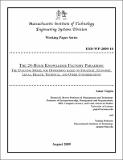The 24-Hour Knowledge Factory Paradigm: The Evolving Model for Offshoring based on Strategic, Economic, Legal, Health, Technical, and Other Considerations
Author(s)
Gupta, Amar
Downloadesd-wp-2009-10.pdf (405.9Kb)
Metadata
Show full item recordAbstract
The 24-Hour Knowledge Factory paradigm involves 3 (or more) collaborating centers, each located in a different continent. Individuals at each center work from 9 am to 5 pm in that country, and then pass the work-in-progress to the next collaborating center to enable round-theclock performance in a manner somewhat akin to the deployment of three shifts in the manufacturing sector.
The 24-Hour Knowledge Factory is relevant for structured and semi-structured applications in many knowledge-based industries including accounting, legal, design, and development. There is a growing array of examples from healthcare and other domains where off-site professionals have been able to provide better results than on-site professionals, thereby validating that many tasks can be more effectively performed using the 24-Hour Knowledge Factory approach.
The gradual adoption of this paradigm is motivated by several considerations. In 2007, the World Health Organization concluded that working at night is a probable cause of breast cancer in women and prostate cancer in men. Attempts by US state governments and even the federal government to discourage outsourcing are unlikely to succeed for multiple reasons, and the notion of “hybrid outsourcing” will gain momentum over time. Plus there are the advantages of developing products and services in a shorter timeframe; furthermore, these products and services can command broader appeal in the global marketplace.
A detailed study was conducted at IBM to compare the performance of a co-located team and a distributed team, and the performance of the latter team exceeded initial expectations. The key results from this study will be discussed in this session.
Date issued
2009-08Publisher
Massachusetts Institute of Technology. Engineering Systems Division
Series/Report no.
ESD Working Papers;ESD-WP-2009-10